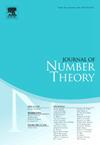多项式无幂值密度 II
IF 0.6
3区 数学
Q3 MATHEMATICS
引用次数: 0
摘要
在本文中,我们证明了满足特定假设的Ⅴ度多项式具有无穷值的期望密度。这扩展了作者早先的结果,在早先的结果中,一种不同的方法隐含了对......度多项式的类似声明。本文章由计算机程序翻译,如有差异,请以英文原文为准。
Density of power-free values of polynomials II
In this paper we prove that polynomials of degree , satisfying certain hypotheses, take on the expected density of -free values. This extends the authors' earlier result in [14] where a different method implied the similar statement for polynomials of degree .
求助全文
通过发布文献求助,成功后即可免费获取论文全文。
去求助
来源期刊

Journal of Number Theory
数学-数学
CiteScore
1.30
自引率
14.30%
发文量
122
审稿时长
16 weeks
期刊介绍:
The Journal of Number Theory (JNT) features selected research articles that represent the broad spectrum of interest in contemporary number theory and allied areas. A valuable resource for mathematicians, the journal provides an international forum for the publication of original research in this field.
The Journal of Number Theory is encouraging submissions of quality, long articles where most or all of the technical details are included. The journal now considers and welcomes also papers in Computational Number Theory.
Starting in May 2019, JNT will have a new format with 3 sections:
JNT Prime targets (possibly very long with complete proofs) high impact papers. Articles published in this section will be granted 1 year promotional open access.
JNT General Section is for shorter papers. We particularly encourage submission from junior researchers. Every attempt will be made to expedite the review process for such submissions.
Computational JNT . This section aims to provide a forum to disseminate contributions which make significant use of computer calculations to derive novel number theoretic results. There will be an online repository where supplementary codes and data can be stored.
 求助内容:
求助内容: 应助结果提醒方式:
应助结果提醒方式:


